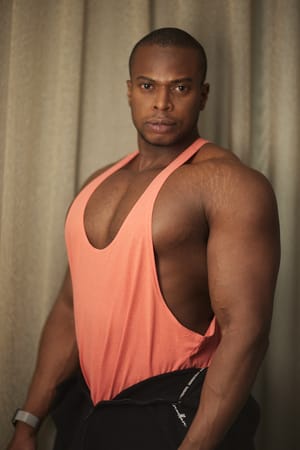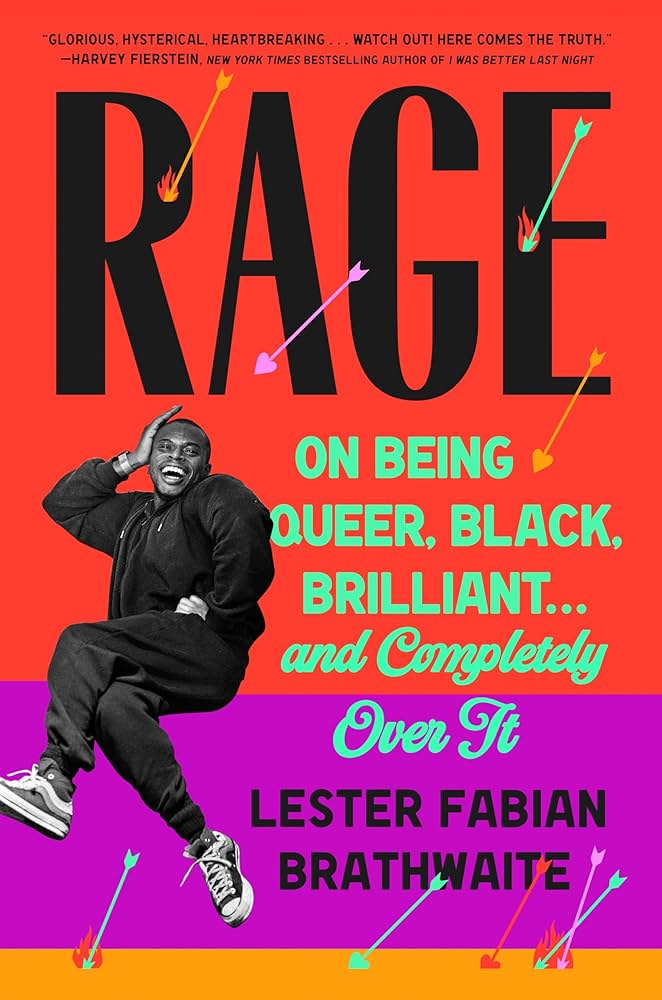To have voices emerge with the sharp wit and unapologetic intensity that Lester Fabian Brathwaite possesses is amazing to witness. His debut book, RAGE: On Being Queer, Black, Brilliant…and Completely Over It, is not just a memoir-in-essays—it is a clarion call, a manifesto wrapped in humor, heartbreak, and searing social commentary. With the precision of a seasoned journalist and the soul of a storyteller, Brathwaite invites readers to grapple with the realities of being a queer Black person in a world that often demands their silence or assimilation.
At the heart of RAGE lies a question that resonates far beyond its pages: “Can a gurl live?”
For Brathwaite, living fully means embracing a state of near-constant rage, one that James Baldwin so eloquently captured decades ago, “to be a Negro in this country and to be relatively conscious is to be in a state of rage almost all of the time.” Brathwaite takes this notion of rage, one rooted in the experience of Blackness, and expands it to encompass the complexities of queerness, masculinity, body image, and the many intersections of identity that he, and countless others, navigate daily.
View this post on Instagram
But RAGE is not a book mired in anger alone. It is also a book of laughter, joy, and creative defiance. As Brathwaite unravels personal narratives and critiques societal norms, he skillfully balances the deeply personal with the universally relatable. His book touches on everything from the toxic culture of dating apps, where sexual racism runs rampant, to the impossible beauty standards perpetuated by white-dominated media. He also writes about his own journey through body dysmorphia and the struggle to reclaim masculinity on his own terms, all while maintaining a sense of humor sharp enough to cut through the darkest of topics.
Brathwaite’s career as a journalist—having written for Entertainment Weekly, OUT, The Advocate, The New Yorker, and Rolling Stone—infuses RAGE with a cultural insight that is both pointed and profound. His sharp commentary on media portrayals of race, sexuality, and gender identity lays bare the ways in which systemic oppression is reproduced, even in spaces meant to represent diversity and inclusion. Yet, for all its societal critique, RAGE remains intensely intimate. Each chapter is a window into Brathwaite’s inner world, filled with moments of vulnerability, humor, and resilience.
RAGE is a book for this moment—urgent, honest, and brimming with insight. RAGE is more than just an act of self-expression—it is a way of carving out space in a society that has long denied him and others like him the right to exist fully and freely. The pages move fluidly between personal stories of love, loss, and self-discovery and broader critiques of the societal forces that shape our understanding of race, sexuality, and gender. Whether he is discussing the tragicomic aspects of his own dating life or the erasure of Black queer bodies in Hollywood or the societal obsession with tearing down Black geniuses like Nina Simone and Lauryn Hill, Brathwaite’s voice remains unwaveringly bold. Brathwaite fearlessly interrogates the contradictions and hypocrisies that have shaped his experiences. Yet, for all its sharp edges, the book is equally defined by its humanity. RAGE a book that will leave readers not only laughing but also thinking deeply about the world we live in and the identities we inhabit.
View this post on Instagram
GLAAD had the delight of speaking with Lester Fabian Brathwaite, on his new book RAGE: On Being Queer, Black, Brilliant…and Completely Over It. Check out what he had to say below.
GLAAD x Lester Fabian Brathwaite

GLAAD: You’ve written for major publications like The New Yorker, Rolling Stone, and Entertainment Weekly, and more. How has your career in journalism informed your approach to memoir and personal storytelling?
Brathwaite: My journalism career was basically practice for this book, particularly my time at Out, where I was really able to hone my voice and dabble in writing the essays that would go on to form the spine of Rage.
GLAAD: You talk about reclaiming rage in your book. What does that process look like for you, and how can others learn to channel their own rage in a constructive way?
Brathwaite: The process looks like this. It’s getting my words and my opinions out into the world and creating dialogue. As for others, rage is a powerful tool, and so I would channel that rage into something you find impossible or exceedingly hard to do. That will either completely exhaust your rage or lead you to achieve that which you never thought you could.
GLAAD: You reference works like Moonlight in shaping Black gay representation. What other media do you feel has shifted the narrative on Black queer love?
Brathwaite: I think the narrative still needs shifting as there still isn’t that much in the way of representation of Black queer love. That being said, I love shows like P-Valley, Harlem, and Dear White People, which have done a good job. Movies have a lot of catching up to do, though.
GLAAD: Laughter plays a key role in your writing. How does humor allow you to engage readers in discussions of serious topics like what comes with the intersectionality of being a Black, gay man?
Brathwaite: Laughter keeps me from screaming my goddam head off out of complete frustration. It’s my coping mechanism to deal with the cruel unfairness of life. And it’s also a great tool to disarm people and open them up to what I have to say. It’s much easier to reach people when they’re laughing than if they’re immediately on the defensive because what I’m saying goes against their beliefs or their view of the world.
GLAAD: What was the most difficult chapter to write, and why?
Brathwaite: Definitely “Silence,” the essay about my mother’s death and funeral. At this point she’s been dead for the majority of my life, and I’ve had to live with that day of her funeral since it also falls on my birthday. Still, I don’t think it’s something I’ll ever get over, as much as that is possible or even desirable. I was tinkering with the ending till nearly the very end of the editing process. It just didn’t feel right. But then I was riding home in an Uber one evening, after a party at a friend’s, buzzing on champagne, and the ending came to me. I was able to fully realize in the essay the positive impact my mother’s death had on me, as well as the drive if not compulsion to live that it inspired in me.
GLAAD: How do you hope RAGE will contribute to the broader discourse on queer and Black identity in America?
Brathwaite: I hope this book gives Black queer folk a sense of seeing themselves, of being understood, and reassures them that they’re not crazy, that their rage is justified, and that they don’t have to let it destroy them. And I hope white gays can get some perspective that they would otherwise be oblivious to, as well as an understanding of how their behavior can harm and negatively affect others in their community, particularly queer people of color.
You can find the book and give it a good read at Amazon and Penguin Random House!













